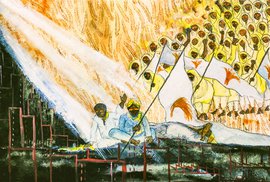She was used to waiting in long lines from the time she was a child – at water taps, in school, in temples, at ration shops, at bus stops, outside government offices. Often, she was made to stand in a separate queue a little distance away from the main one that would get attended to first. She was also used to the disappointments that so often greeted her when her turn finally arrived. But today outside the crematorium she could not bear it anymore. She wanted to leave his body right there in her neighbour Nizambhai’s auto and race back home.
She wondered how long the queues were when Bhikhu was here few days ago with his old mother’s body. But it was not only the death of his mother that broke him; she had seen his spirit crumble much before, watching his people suffer without money, without food, without jobs, aimlessly agitating for months to get the malik to pay their pending wages, struggling to find some work that would pay enough, and getting crushed under debt much before the bimari swallowed them up. This merciless bimari was perhaps a boon for their lot, was what she used to think. Until…
Would that special injection have saved him? The doctor from the private clinic near the colony was ready to give it, if they arranged for it. She knew she could have tried harder. So what if the lines were too long and there was no luck at the end? The hospital had run out of kits. Try the next day they had said. Surely she could have? “I know some place where you can get it for 50,000 in cash,” Nizambhai had said with a sigh. Where was she going to raise even a fraction of that sum? The memsahibs had stopped giving her salary for the days she missed, let alone any advance on her payments.
His body was hot like a furnace and he was struggling to breathe when she finally got him into Nizambhai’s auto in the middle of the night. When she had called 108, they said it would take two to three hours and anyway there were no beds to be found anywhere. The queue outside the government hospital was even longer. The wait would be more since she was in a private auto, she was told. He barely opened his eyes then. She kept holding his hand, rubbing his back and his chest, forcing him to take small sips of water, asking him to hold on as they waited endlessly, without sleep, without food, all three of them -- until mid-morning when he finally gave up, two patients away from his turn.
There was yet another queue at the crematorium…

Moksha
Take this borrowed breath
And drown in it your lust for life
Go, get lost in the valleys
behind your closed eyes, so dark,
don’t insist on light.
Let this life-wish
Still stuck, sob-like, in your throat
flow with the restless screeches
of ambulances in the night air,
melt into the wails around us
echoing like sacred chants.
Cover your ears tight
with this heavy, desolate,
scorched loneliness
that spreads itself on streets.
The
tulsi
has dried up.
Place that
narayani
name
of your love instead
at the tip of your tongue
and swallow it down with this
sparkling
gangajal
of memory.
Wash your body with tears
cover it with sandalwood dreams
place your folded palms on your chest
and shroud yourself
in thick white misery
let there be a tiny flicker of love
in those eyes as you sleep
and let your last burning sigh
light the life underneath this hollow body
all crumbled now into a haystack
waiting forever for a spark
Come, light your pyre tonight and wait
For sputtering flames to engulf you.
Audio: Sudhanva Deshpande is an actor and director with Jana Natya Manch, and an editor with LeftWord Books.



